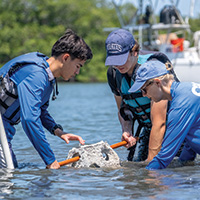 Marine science students from St. Ed’s get immersed in lagoon-health project
Marine science students from St. Ed’s get immersed in lagoon-health project
STORY BY REGINA MARCAZZO-SKARKA (Week of April 25, 2024)
Photo: Students Ace Barker, Justus Hufnagel and Missy Weiss.
Marine science students from Saint Edward’s School spent class time last week investing in the health of the Indian River Lagoon, carrying and installing heavy reef material into the water at Riverside Park on Vero’s barrier island.
The outing included juniors and seniors from Brandy Nelson’s Marine Science class who assisted the Ocean Research and Conservation Association’s efforts to protect the shoreline, improve water quality, and provide a vital oyster habitat.
Hundreds of 50-pound oyster reef balls were placed in grids of eight just off the shore. About a dozen students carried some of the heavy reef material and placed it in grids before returning to school. Missy Weiss, ORCA’s director of citizen science and education, remained in the water and guided the students as they placed the structures in the grid.
Every oyster the spherical reef attracts can filter up to 50 gallons of water per day. “It breaks up the energy of the water,” said student Ace Barker, explaining how the material protects the shoreline from erosion while providing a habitat for the oysters. The design imitates the oysters’ natural habitat and provides an environment for their growth.
Working off campus is nothing new to the marine science students, who are always grateful for the opportunity to be outside and contribute. While they have many lectures and lab sessions at school, they venture out monthly to put what they’ve learned to work in the field. Besides their participation in specific projects, the students use boats and kayaks to explore, collect, and observe within the Indian River Lagoon Estuary.
“It’s really cool because we’ll learn about a unit and get hands-on learning,” said junior Harrison Reicher.
“It makes you more aware. It also improves how you treat the environment,” adds Carson Yates, also a junior.
The Living Shoreline project also strengthens students’ critical thinking, problem-solving, and teamwork abilities. “They are out in the fresh air, working hard and being a part of solving an environmental problem together,” said Nelson.



